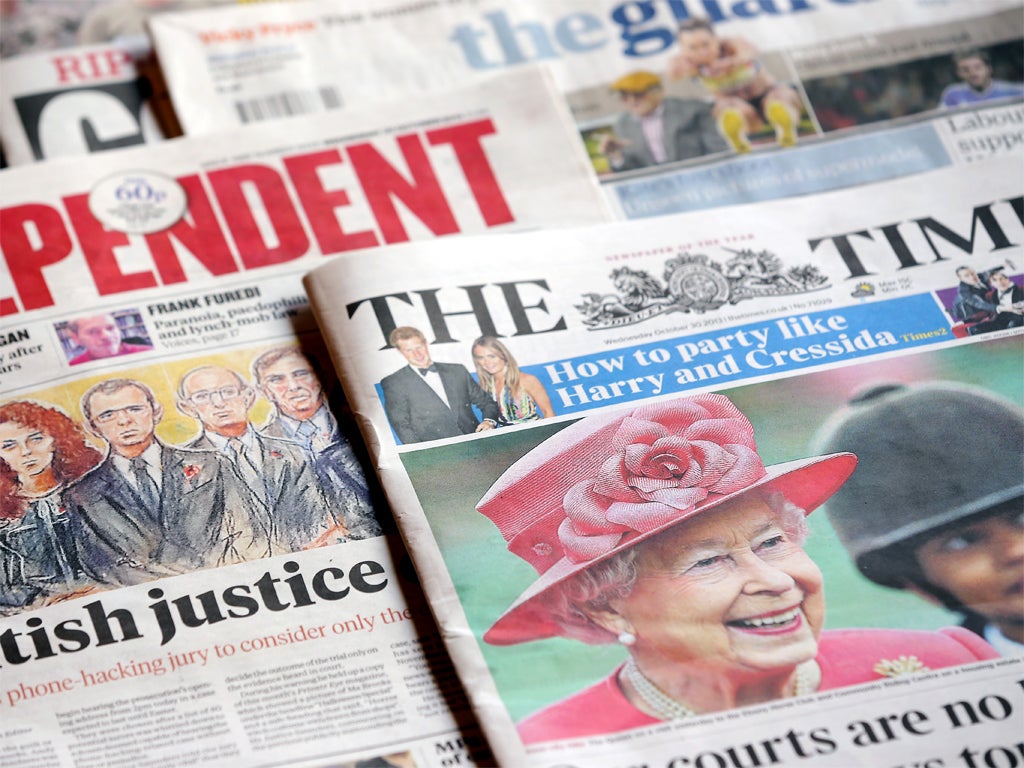Queen sets seal on cross-party politicians' charter for press regulation
Senior press figures warn they will not sign up for scheme that they see as ‘state interference’

After a succession of last-gasp legal attempts by the newspaper industry to thwart the process, the Queen has given her approval to a government-backed royal charter governing the regulation of the press.
At a meeting of the Privy Council, the Queen set her seal on the document, which is backed by the three main political parties but is almost universally opposed by the publishers it is intended to oversee.
Hours earlier, senior newspaper representatives had gone to the High Court to seek an injunction to stop the Privy Council hearing, claiming that the industry’s own version of a reform charter had been unfairly rejected.
At lunchtime, Lord Justice Richards, sitting at an emergency hearing with Mr Justice Sales, had denied the press representatives an injunction, saying the dismissal of the rival charter by a committee of the Privy Council this month had not been unlawful.
The Press Standards Board of Finance (Pressbof) immediately took its case to the Court of Appeal. But at 4.45pm – 45 minutes before the Privy Council was due to meet – Lord Dyson, Master of the Rolls, sitting with two other Court of Appeal judges, refused the final application for an injunction pending further legal action. “We are not willing to grant interim relief ‘administratively’ pending an application for permission to appeal,” he said.
In an attempt to lessen industry opposition to the charter, the Government announced a series of late amendments before it was submitted to the Privy Council. One concession, designed to allay fears that politicians might meddle with the freedom of the press, means any future changes to the charter will require the unanimous agreement of the recognition body’s board as well as a two-thirds majority in both Houses of Parliament.
The Privy Council meeting, held at Buckingham Palace, was attended by four ministers: Deputy Prime Minister Nick Clegg, Health Secretary Jeremy Hunt, Culture Secretary Maria Miller, and the Liberal Democrat justice minister, Lord McNally of Blackpool.
Tony Gallagher, editor of The Daily Telegraph, was among the first senior press figures to express anger that politicians were imposing their charter and to indicate that his title would not comply. “Well done everyone involved in the royal charter,” he commented on Twitter with heavy sarcasm. “Chances of us signing up for state interference: zero.”
Mrs Miller acknowledged that the press did not have to sign up to a regulator set up under the charter but she said she hoped they would do so. “Self-regulation is exactly that… and the press obviously can choose to be subject to the royal charter or not, that is inherent in the process,” she said.
The passing of the government charter was “disappointing”, said Bob Satchwell, executive director of the Society of Editors. “Those who seem to want to neuter the press forget that there are 20 national papers, 1,100 regional and local papers and hundreds of magazines who have not done any wrong but they are willing to submit themselves to the scrutiny of the most powerful regulator in the Western world, so long as it is independent of politicians now and in the future.”
The charter establishes a recognition body to oversee a powerful new regulator set up by the industry.
Hacked Off, the lobby group that has led the campaign for tighter regulation, welcomed the decision. “News publishers now have a great opportunity to join a scheme that will not only give the public better protection from press abuses, but will also uphold freedom of expression, protect investigative journalism and benefit papers financially,” it said.
The Privy Council: What is it?
Established in 1231 by Henry III, the Privy Council includes hundreds of politicians, royalty and other leading figures from the UK and from the Commonwealth.
However, just four ministers – Deputy Prime Minister Nick Clegg, who is Lord President of the Council, Health Secretary Jeremy Hunt, Culture Secretary Maria Miller and the Liberal Democrat Justice minister, Lord McNally of Blackpool – were present at the council meeting at Buckingham Palace yesterday when the Queen set her seal on the new Royal Charter governing regulation of the press.
On its website, the council dismisses its reputation for secrecy as a “myth” that stems from the wording of a Tudor-era oath, still taken by councillors, which requires them to “keep secret all matters”.
Other members of the council include Prince Philip, New Zealand’s former Prime Minister, Helen Clark, and the Labour politician Lord Mandelson.
Join our commenting forum
Join thought-provoking conversations, follow other Independent readers and see their replies
Comments
Bookmark popover
Removed from bookmarks